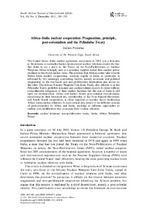Africa–India nuclear cooperation: pragmatism, principle, post-colonialism and the Pelindaba Treaty
Abstract
The United States India nuclear agreement, announced in 2005, was a first step
in the process to normalise India’s international nuclear relations despite the fact
that India is not a party to the Treaty on the Non-Proliferation of Nuclear
Weapons. Africa is largely seen as a uranium supplier rather than nuclear power
producer in the world nuclear order. The position that African states take towards
Africa India nuclear cooperation, uranium supply to India in particular, is
informed by two seemingly contrasting factors, namely economic and political
pragmatism on the one hand, and non-proliferation imperatives and norms on
the other. The African Nuclear Weapons Free Zone Treaty, also referred to as the
Pelindaba Treaty, prohibits uranium and nuclear-related exports to states without
comprehensive safeguards of their nuclear facilities, but the case of India is still
open for interpretation. Africa and India’s shared post-colonial consciousness,
manifesting in their historical ties, membership of the Non-Aligned Movement
and South South cooperation, is often regarded as another factor facilitating
Africa India nuclear relations. A more critical view points to the different notions
of post-coloniality in Africa and India, resulting in different approaches to
nuclear non-proliferation that constrain their nuclear relations.

